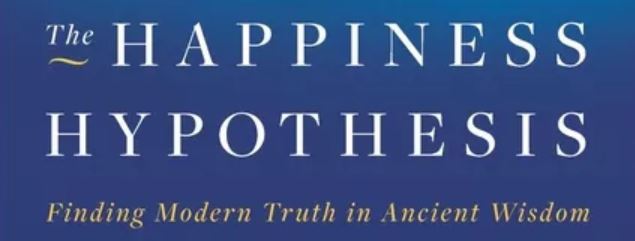
I’m listening to The Happiness Hypothesis by Jonathon Haidt. He is a social psychologist and what I’d call a public intellectual. His books are for a general audience and address the research relating to culture, moral and philosophy. I’m enjoying the book so far, and wanted to post some interesting ideas he presents.
Like any public intellectual, his assertions are interesting, but superficial and arguable. More research would be needed to explore concepts farther.
One topic he talks about is baseline happiness. Studies of people who won big money in a lottery or became paralyzed in an accident, return to their typical level of happiness after about a year. The explanation is that when someone wins the lottery, the first day is their best. After that, they are hounded for money and faced with novel decisions. In the same way, the first day is the worst for someone who is suddenly paralyzed. Over time, therapy and accommodations mitigate the disaster.
The essential idea is that people adapt to their situation, whether good or bad. A person living in a big, nice house are initially thrilled, but over time, it’s just where they live.
Haidt differentiates between happiness and gratification. Gratification is fleeting. Having a great meal is gratifying, but doesn’t change your life.
According to research cited by Haidt, people have a general happiness set point. It seems kind of like people having a body weight set point. After a diet, the body wants to get back to that set point.
Haidt maintains that there are three ways to change that set point.
- Cognitive therapy
- Prozac or other SSRI medications
- Meditation
He does not address what constitutes good cognitive therapy, the down-sides to Prozac or what type of meditation. That is the additional research I mentioned earlier.
According to Haidt, a person’s happiness set point depends on genetics, their activities and external factors.
A basic concept is that people can adapt to many external factors. Once a person can afford the necessities, more money does not bump the needle on happiness once they have adapted to their lifestyle. There are two things to which people do not adapt. Intermittent noise and traffic congestion.
Since people can choose their lifestyle, within external constraints, Haidt concentrates on that as a means to increase happiness. To avoid adapting, people should pursue activities that challenge their strengths. That keeps people productive and engaged.
Like I said, it isn’t difficult to argue with assertions in this sort of book, but the basic ideas make sense and it gets the reader to think.
I used to wonder what heaven would be like. Any situation I could imagine, would eventually become familiar and boring. To be happy, I need challenges, and that requires effort and the possibility of failure. For me, heaven would be having room for my stuff and all of it organized. Once I decided I could approach heaven on Earth, I had my garage built.
Not counting the Covid year, I thoroughly enjoyed my teaching career. I never had sufficient resources, an adequate room or perfect students. I enjoy being mildly vexed. It gives me something to push against.
For completeness, I also developed a theory for Hell. After you die, all questions are answered. The sense of regret would be oppressive.
St. Peter: “Oh yeah, income tax was voluntary. You didn’t have to pay, it’s right there on the instructions. ‘The system is based on voluntary compliance.’ Getting people to pay was one of Satan’s best tricks. Almost everyone falls for it.”
St. Peter: “Turns out, women are as horny and indiscriminate as men. All you had to do is ask. Tina from Burger King, that English teacher you worked with, the software engineer from Vetrotex, they were all DTF. When women get here, they always want to know why guys didn’t ask. So strange.”
The point is, it’s an interesting book, and I wanted to capture some thoughts before finishing it.